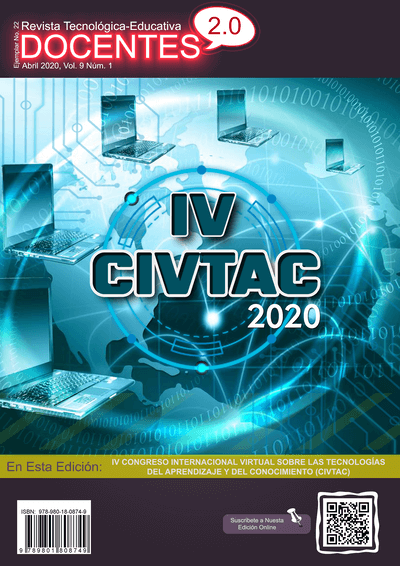The Webquest as a didactic tool to enhance critical thinking in the training of university students
 DOI:
https://doi.org/10.37843/rted.v9i1.96
DOI:
https://doi.org/10.37843/rted.v9i1.96
Main Article Content
Abstract
The WebQuest is a didactic resource based on constructivist learning that is having great success in the educational context. However, there have been deficiencies when incorporating new technologies in the teaching-learning processes, specifically at the higher education level since there are no specific digital resources for the different subjects taught in the training of future undergraduate professionals. Therefore, in this study, the objective is to integrate the activity of WebQuest through the creation of the didactic instrument that allows the development of individual and collaborative skills both in the classroom and outside it, which allows the strengthening of the teaching and learning process in the higher education institution. This research uses a mixed approach that, through data collection instruments such as direct observation, literature review and survey, addressed 34 professionals in training at a higher level. This allows us to describe the importance of the use of this Webquest didactic instrument in the educational environment and how it favors the development of cognitive skills in students. Within the results of this research, the development of 6 Webquest instruments elaborated by workgroups formed by the 34 participants can be highlighted. It can be concluded that the implementation of this didactic instrument facilitates the didactic possibilities, which enhance the cognitive skills promoting critical thinking, generating significant learning through the creation of digital resources. Furthermore, it is necessary to suggest what to do to achieve all these advances is recommended to enhance the digital competences of the professionals in training.
Downloads
Metrics
Article Details

This work is licensed under a Creative Commons Attribution-NonCommercial-NoDerivatives 4.0 International License.
Those authors who have publications in our journal accept the following terms:
- When a work is accepted for publication, the author retains rights of reproduction, distribution of his/her article for exploitation in all countries of the world in the format provided by our magazine and any other magnetic medium, optical, and digital.
- Authors will retain their copyright and guarantee the journal the right first to publish their work, which will be simultaneously subject to the Creative Commons Acknowledgment License (Attribution-NonCommercial-NoDerivatives 4.0 International (CC BY-NC-ND 4.0)). That allows third parties to copy and redistribute the material in any medium or format, under the following conditions: Acknowledgment - You must properly acknowledge authorship, provide a link to the license, and indicate if any changes have been made. You may do so in any reasonable way, but not in a way that suggests you have the licensor's endorsement or receive it for your use. NonCommercial - You may not use the material for a commercial purpose. NoDerivatives - If you remix, transform, or build from the material, you cannot broadcast the modified material. There are no additional restrictions - You cannot apply legal terms or technological measures that legally restrict you from doing what the license allows.
- Authors may adopt other non-exclusive license agreements to distribute the published version of the work (e.g., deposit it in an institutional archive or publish it in a monographic volume) provided that the initial publication in this journal is indicated.
- Authors are allowed and recommended to disseminate their work through the Internet (e.g., in institutional telematic archives, repositories, libraries, or their website), producing exciting exchanges and increasing the published work's citations.
- Request of withdrawal an article has to be done in writing by the author to the Editor, becoming effective after a written response from the Editor. For this purpose, the author or authors will send correspondence via e-mail: [email protected].
- The author will not receive financial compensation for the publication of his work.
- All Docentes 2.0 Journal publications are under the Open Journal System (OJS) platform at: https://ojs.docentes20.com/.
References
Cacheiro Gonzalez, M., (2011). Recursos educativos tic de información, Colaboración y aprendizaje. Pixel-Bit. Revista de medios y educación, n. 39, pp. 69-81.
Castillo, S., (2008). Propuesta pedagógica basada en el constructivismo para el uso óptimo de las TIC en la enseñanza y el aprendizaje de la matemática. Revista latinoamericana de investigación en matemática educativa, v.11, n. 2, pp. 171-194.
Castillo, S., (2008) Propuesta pedagógica basada en el constructivismo para el uso óptimo de las TIC en la enseñanza y el aprendizaje de la matemática. Revista latinoamericana de investigación en matemática educativa, v.11, n. 2, pp. 171-194.
Diaz, A., & Hernandez, R., (2015). Constructivismo y aprendizaje significativo. MC GRAW HILL. http://metabase.uaem.mx//handle/123456789/647
Diaz, F. (2001). Habilidades de pensamiento crítico sobre contenidos históricos en alumnos de bachillerato. Revista Mexicana de Investigación Educativa, v. 6, n. 13. https://www.redalyc.org/pdf/140/14001308.pdf
Granados, A. (2015). “Las TIC en la enseñanza de los métodos numéricos”. Sophia, v. 11, n. 2, pp.1 - 13. https://www.redalyc.org/pdf/4137/413740778003.pdf
Hernández, S. (2008). El modelo constructivista con las nuevas tecnologías: aplicado en el proceso de aprendizaje. Revista de Universidad y Sociedad del Conocimiento, v.5, n. 2, pp. 26- 35. https://www.redalyc.org/pdf/780/78011201008.pdf
León Pirela, A. R., & Fernández Reina, M. T. (2018). La webquest como estrategia didáctica en el modelo pedagógico del aula invertida. Revista Electrónica de Ciencia y Tecnología del Instituto Universitario de Tecnología de Maracaibo, v. 5, n. 1, pp. 1-20.
López Aymes, G. (2012). Pensamiento crítico en el aula. Docencia e Investigación, v. XXXVII, n. 22, pp. 41-60.
Quiroz, E. (2009). Recursos didácticos digitales: medios innovadores para el trabajo colaborativo en línea. Revista Electrónica Educare, v. 13, n. 2, pp. 47-62.
Ramon, P. M. (2013). La webquest como herramienta de enseñanza-aprendizaje en educación superior. Revista Electrónica de Tecnología Educativa, v. 45, n. 45, a247.
Tobód, S., Pérez, J. F., & Antelo, M. L. (2018). Tecnología e innovación más ciencia e innovación en América Latina (Vol. 3). Colombia: Corporación Cimted. http://bit.ly/2TTYwcJ
Velázquez, J., & Rodríguez, I. (2018). Webquest como herramienta de apoyo para el proceso investigativo. Revista Ciencias de la Educación, v. 28, n. 52, pp.738-762.






